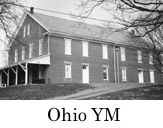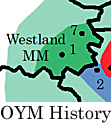Jonathan Knight... was a resident within the present limits of West Pike Run township for many years. He was one of the most widely-known and highly-esteemed men of Washington County or of Western Pennsylvania. He served with honor in both Houses of the State Legislature, and was a member of congress from his district. He was the most famous surveyor in this section of the country, and became one of the most eminent civil engineers of his day in the United States. The place where he lived and died is about one mile east of the town of Centerville, and now within the limits of West Pike Run township, though originally in East Bethlehem, the change being caused by a readjustment of the lines between the two townships to conform to the route of the old National Road. His residence was but a very short distance north of the township line in West Pike Run, and apparently always continued to regard himself as belonging to East Bethlehem, which was his post-office address. A very brief and modest (yet comprehensive) autobiographical sketch of ... Knight, prepared for Lanman's "Dictionary of Congress" in 1858, copied from the original manuscript, and furnished by his son, William Knight, now residing at or near Marysville, Marion Co., Iowa, is here given:
I was born of poor but respectable parents, in Bucks County, Pa., on [Eleveenth Month 22,] 1787, and with them removed in 1801 to East Bethlehem, Washington Co., in the same State, where I yet reside, engaged in agriculture.
In 1809 I married Ann Heston, in a meeting of the religious society of Friends, in accordance with their good order, and we still remain in religious fellowship with that society. The limited means at command did not permit of my education in any college, nor in any seminary of learning above the ordinary primary school then in the country. Nevertheless, an unquenchable thirst for knowledge impelled me to read and study at home, mostly at nights, by which means I acquired a pretty good American education, and a competent store of mathematical learning, and became a teacher in schools and a surveyor of land and of roads.
About the year 1816 I was appointed by the State government of Pennsylvania to make and report a map of Washington County, in order to facilitate the forming of Melish's map of the State. This duty involved much field labor, the instrumental surveys requiring an hundred days in their performance. That service having been satisfactorily performed, I served three years as county commissioner, to which office I was elected by the people. Soon I entered upon civil engineering, and after assisting in a subordinate station in the preliminary surveys for the Chesapeake and Ohio Canal and in those of the National or Cumberland road, between Cumberland and Wheeling, I was appointed in 1825, by the Federal government, a commissioner to extend that road, and accordingly did extend it from Wheeling through the States of Ohio and Indiana to the eastern line of the State of Illinois.
In 1822 I was elected a member of the Legislature of Pennsylvania, and served in the House of Representatives and in the Senate six sessions. In 1826 I resigned my seat in that Senate and entered the service of the Baltimore and Ohio Railroad Company, and visited England to acquire knowledge in that then new department of civil engineering. Returning, I accepted the office of chief engineer for that company in 1830, which I held until 1842. Retiring then to the farm, I continued the pursuit of agriculture, for which I was always partial, with only occasional times or absence from home on professional or other calls until 1854, when I was elected to the Thirty-fourth Congress in the Twentieth District of Pennsylvania, composed of Fayette, Greene, and Washington Counties. Having served through the three sessions of that Congress, and failing of a re-election in 1856, I again retired to a rural and private life on the farm at East Bethlehem. (Signed) "J. Knight."
[Cumrine inserts the following note: On the 2d of March, 1842, on the occasion of the acceptance of ... Knight's resignation, the board of directors of the Baltimore and Ohio railroad Company took the following action:
"On motion of Gen. Marriott, seconded by ... S.J. Donaldson, the following resolutions were adopted, viz.: Resolved, unanimously, That in accepting the resignation of Jonathan Knight, Esq., as chief engineer, the board feel it to be a duty to express the high sense entertained of his worth as a man and merits as an officer; and also to acknowledge the value and importance of the services rendered by him in the responsible office which he has so long held with credit to himself and justice to the interests of the company. Resolved, That the president cause a copy of the above resolutions to be transmitted to Jonathan Knight, Esq."]
"The leading characteristics of ... Knight as a professional man," says ... B.H. Latrobe, who was Jonathan Knight's successor as chief engineer of the Baltimore and Ohio Railroad, "were strongly marked, and entitled him to a high rank in the roll of American civil engineers. His natural aptitude for the acquisition of knowledge in the exact sciences, and especially those which depend upon the skillful use of algebraic analyses, was unsurpassed. The habit of close thinking, into which he was led by the natural tendencies of his mind to mathematical investigation, made him reason rightly on all subjects, and gave a philosophical cast to his conversation upon almost every topic that he touched. Yet his remarks were not a series of dry abstractions, but were practical in their bearings and enriched by illustration and anecdote. In political economy he was well versed, and expressed enlightened and comprehensive views upon the subject of banking, trade, manufactures, and agriculture, of the last of which he possessed much practical knowledge, derived from experience and careful observation. Politics also was a favorite theme with him, and upon public measures he always expressed broad and national views. He discussed the characters of public men with great spirit, and often with a sarcastic humor which marked his conversation on most subjects. The character of Henry Clay appeared to be his ideal of a statesman and orator. In private life he was distinguished by many excellent qualities. He raised a large family,--ten children,--fulfilling his domestic duties in the most exemplary manner, bringing up his children in the fear of God, providing for them with a judicious regard to their several capacities and dispositions. He left a comfortable estate, after having settled all his children during his own lifetime, and among his neighbors and many friends a character of unsullied probity and consistent Christian kindness." [Adapted by Cumrine from Stewart's Civil and Military Engineers of America, pp. 240-241.]
Jonathan Knight died at his residence in West Pike Run township, Nov. 22, 1858. The following account of the event, and of the fatal illness preceding it, is furnished by his eldest son, William Knight, of Iowa: "He was taken suddenly ill with bilious colic in a very severe pain and a continual oppressive sensation in the chest. He died on the tenth day of his illness, being the seventy-first anniversary of his birthday... During his last illness he was very patient and calm, conversed little, but always spoke pleasantly to those about him, recognizing them until the last moment, and with his last words said that he had made his peace with God, and had no matter to make up with any man, and that he was entering upon a state of rest and happiness in the life to come." |






